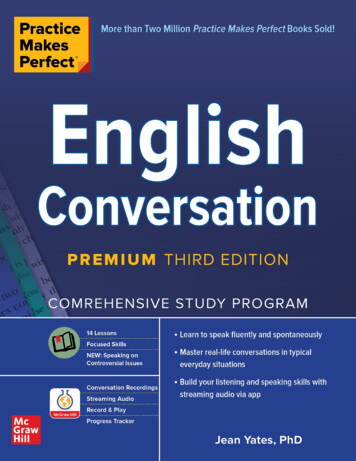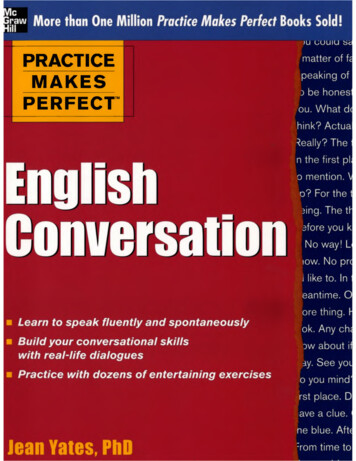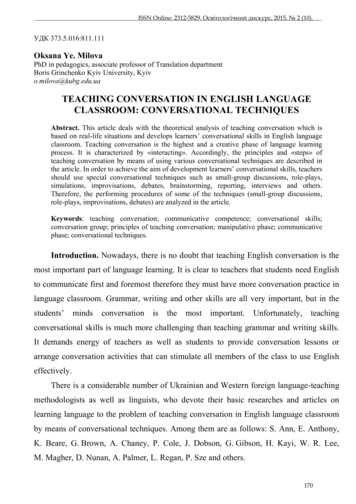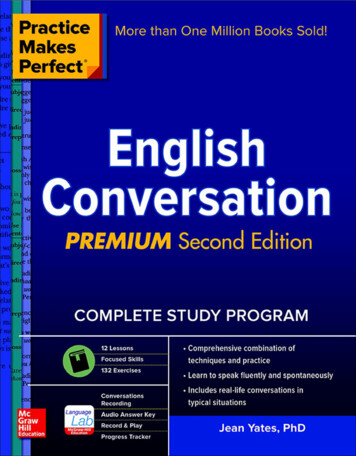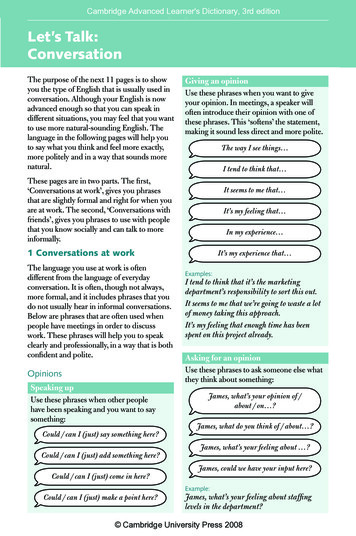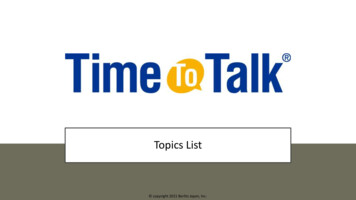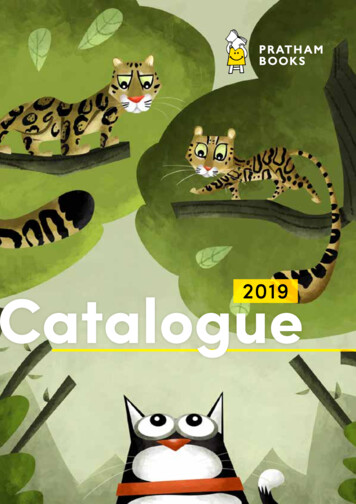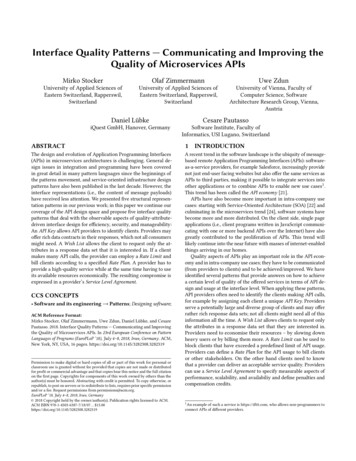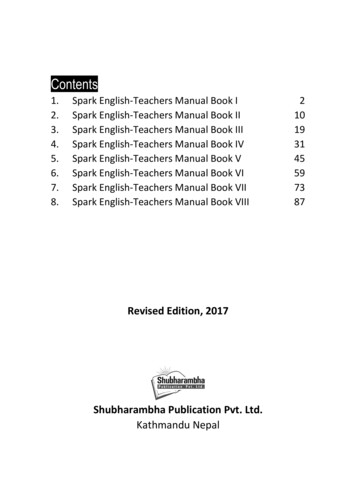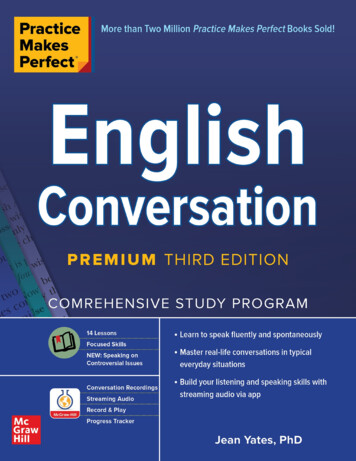
Transcription
Copyright 2020 by McGraw-Hill LLC. All rights reserved. Except aspermitted under the United States Copyright Act of 1976, no part of thispublication may be reproduced or distributed in any form or by any means, orstored in a database or retrieval system, without the prior written permissionof the publisher.ISBN: 978-1-26-046217-3MHID: 1-26-046217-XThe material in this eBook also appears in the print version of this title:ISBN: 978-1-26-046216-6, MHID: 1-26-046216-1.eBook conversion by codeMantraVersion 1.0All trademarks are trademarks of their respective owners. Rather than put atrademark symbol after every occurrence of a trademarked name, we usenames in an editorial fashion only, and to the benefit of the trademark owner,with no intention of infringement of the trademark. Where such designationsappear in this book, they have been printed with initial caps.McGraw-Hill Education eBooks are available at special quantity discounts touse as premiums and sales promotions or for use in corporate trainingprograms. To contact a representative, please visit the Contact Us page atwww.mhprofessional.com.McGraw-Hill Education, the McGraw-Hill Education Publishing logo,Practice Makes Perfect, and related trade dress are trademarks or registeredtrademarks of McGraw-Hill Education and/or its affiliates in the UnitedStates and other countries and may not be used without written permission.All other trademarks are the property of their respective owners. McGrawHill Education is not associated with any product or vendor mentioned in thisbook.McGraw-Hill Language Lab AppAudio recordings of the conversations in this book are available to supportyour study. Go to www.mhlanguagelab.com to access the online version of
the application, or to locate links to the mobile app for iOS and Androiddevices. (Note Internet access is required to access audio via the app). Moredetails about the features of the app are available on the inside front cover.TERMS OF USEThis is a copyrighted work and McGraw-Hill Education and its licensorsreserve all rights in and to the work. Use of this work is subject to theseterms. Except as permitted under the Copyright Act of 1976 and the right tostore and retrieve one copy of the work, you may not decompile, disassemble,reverse engineer, reproduce, modify, create derivative works based upon,transmit, distribute, disseminate, sell, publish or sublicense the work or anypart of it without McGraw-Hill Education’s prior consent. You may use thework for your own noncommercial and personal use; any other use of thework is strictly prohibited. Your right to use the work may be terminated ifyou fail to comply with these terms.THE WORK IS PROVIDED “AS IS.” McGRAW-HILL EDUCATIONAND ITS LICENSORS MAKE NO GUARANTEES OR WARRANTIESAS TO THE ACCURACY, ADEQUACY OR COMPLETENESS OF ORRESULTS TO BE OBTAINED FROM USING THE WORK, INCLUDINGANY INFORMATION THAT CAN BE ACCESSED THROUGH THEWORK VIA HYPERLINK OR OTHERWISE, AND EXPRESSLYDISCLAIM ANY WARRANTY, EXPRESS OR IMPLIED, INCLUDINGBUT NOT LIMITED TO IMPLIED WARRANTIES OFMERCHANTABILITY OR FITNESS FOR A PARTICULAR PURPOSE.McGraw-Hill Education and its licensors do not warrant or guarantee that thefunctions contained in the work will meet your requirements or that itsoperation will be uninterrupted or error free. Neither McGraw-Hill Educationnor its licensors shall be liable to you or anyone else for any inaccuracy, erroror omission, regardless of cause, in the work or for any damages resultingtherefrom. McGraw-Hill Education has no responsibility for the content ofany information accessed through the work. Under no circumstances shallMcGraw-Hill Education and/or its licensors be liable for any indirect,incidental, special, punitive, consequential or similar damages that resultfrom the use of or inability to use the work, even if any of them has beenadvised of the possibility of such damages. This limitation of liability shall
apply to any claim or cause whatsoever whether such claim or cause arises incontract, tort or otherwise.
ContentsPreface1 Introducing yourself and others2 Expressing opinions, likes, and dislikes3 Describing people, places, and things4 Striking up a conversation5 Making dates and appointments6 Expressing wants and needs7 Making requests and offers8 Expressing doubts and uncertainty9 Talking about future events10 Making a case or arguing a point11 Narrating a story12 Retelling a conversation13 Talking about controversial issues14 Electronic conversation
Appendix A: Irregular past tense and past participle formsAppendix B: Short tag questions and answersAppendix C: GlossaryAnswer key
PrefacePractice Makes Perfect: English Conversation is designed to give youpractice with the vocabulary and structures that are most often used incommon types of informal conversations.The book consists of fourteen chapters, each one devoted to a particularconversational function. Each chapter begins with a typical conversationfollowed by a discussion of vocabulary and structures that are particularlyimportant for the type of conversation being addressed. Certain expressionsare repeated in other chapters so that you will become more familiar withthem as they occur in different contexts. Following the discussion section areseveral sets of exercises to help you feel confident that you understand thematerial. The exercises also give you practice in using new vocabulary andstructures so that you will be able to include them in your personalconversations.Use this book and the accompanying audio recordings (available via app),practice your English in conversations with your English-speaking friends,and continue to enjoy this language.
Introducing yourself and othersConversation: Meeting at a partyTODD: Hi—you must be John’s cousin Matt, right? From San Diego?MATT: Correct! I just got in last night.TODD: I’m Todd, John’s roommate from Tech. Glad to meet you. I canassure you that I’m not anything like what John has told you.MATT: I’m happy to meet you, too—and, yes—I have heard about you!Football player and party animal extraordinaire.TODD: Football, yes—and as a matter of fact, I do like parties. But tell memore about yourself and what you do in San Diego.MATT: Well, I’m more (of) a surfer than a football player. You know, SanDiego has a fantastic coast—and we can surf all day and then party on thebeach at night.TODD: That sounds awesome. How long are you staying?MATT: Well, I’ll be here for two weeks. John has promised me a nonstopschedule—kind of a mix of sightseeing, meeting his friends, checking outthe local scene, and—hopefully—camping in the mountains for a coupleof days.TODD: John’s a good guy—and you can be sure he knows the local scene.He knows everybody in town. I’m sure he’ll show you a good time. Andhis friends are here to help.MATT: Thanks so much—I really appreciate that. I’m still a bit jet-lagged atthe moment but should be in good shape by tomorrow. I’m lookingforward to hearing what John has in store for me. . . .TODD: Don’t worry. We’ll all take good care of you. And don’t be surprised if
we show up on your doorstep in San Diego one day, ready for surfing!Improving your conversationI’m Todd (Jones)Simply using I’m and then saying your name is one way to introduceyourself. You could also say, for example, My name’s Todd (Jones). It iscustomary to offer your right hand in a handshake to the other person. In veryinformal situations, you could just say Hi, I’m Todd, with no handshake.To introduce one or more people other than yourself, say:This is (my wife,) Mary. And this is Susan, Bob, and Joe.To introduce more than one person and also tell how you know them, say:These are my friends, Susan and Bob. And this is Jim, mycoworker.All of the people introduced would then shake hands. You could also say:I want you to meet (my friends,) Susan and Bob.Glad/happy to meet youWhen you have been introduced to someone, it is customary to say (I’m)glad/happy to meet you or It’s nice to meet you. The reply is I’m happy tomeet you or I’m happy to meet you, too. (The underlined words arepronounced slightly louder than the others.)Right?Right? is an informal way to ask for confirmation that what you have justsaid is true. The answer can be That’s right!
Correct!This is an informal answer to a question that asks for confirmation.If you want to tell your questioner that he or she is not correct, you canpolitely say this with, for example:No, that’s not right.No, that’s not correct.No, I’m not Matt; I’m Jim.No, she isn’t my sister. She’s my cousin.(The underlined words in the examples should be spoken slightly louder thanthe other words in the sentence.)To sarcastically indicate that something is not correct, Yeah, right! isused.Am, do, etc.When a yes-or-no question using the verb to be is asked, the answer can bemade emphatic by following it with a tag, in which, if the answer is yes, theverb is said a little louder than the other words. Affirmative tag answers arenot contracted.When the answer is no, there are two ways to answer with a tag. Theunderlined words are the ones said a little louder. Negative tag answers areusually contracted. The full form makes them more emphatic.
When an information question using any verb other than to be is asked, theanswer can be made emphatic by following it with a tag, in which the verb issaid a little louder than the other words.As a matter of factAs a matter of fact is a common expression that has a number of differentmeanings. In our example conversation it introduces a confirmation of whatwas previously said. It can go before the main clause or after the verb.You can express the same meaning with actually, but put it after the verb.JustThis use of just indicates that something happened only a short time before.It can be used with the past tense or with the present perfect tense. Forexample:
To get inTo get in means to arrive and is usually used in the past tense.What time did you get in?They got in late last night.Another way to say to arrive, when it refers to the future, is to get there.I hope we get there on time.She will get there by six.To get in can also mean to be accepted by a school/college/university orother group with limited membership.He applied to that college and really hopes to get in.She didn’t get in her first choice of sororities, but she got in anotherone, and she’s happy.I can assure you that . . . /you can be sure (that) . . .These are common ways of saying that you believe something to be true,hoping to win the confidence of the person you are talking to.I can assure you that I will work hard.You can be sure that something interesting will happen.Here is another way to express that you believe something to be true:I promise you that we won’t leave until the work is done.
Party animalParty animal is an informal expression used to characterize someone whospends a lot of time with friends or acquaintances for entertainment—eitherat home or in public places.My friend Eric will take you downtown on Saturday night; he’s a realparty animal, so you’ll meet lots of people.ExtraordinaireExtraordinaire is a word borrowed from French, pronounced in English “ekstra or d- NAYRE.” It is used to exaggerate the meaning of the previousword.I’d like you to meet Marc—he’s our pastry chef extraordinaire. Youhave to try his cheesecake!What do you do?The question What do you do? asks what one’s job or occupation is. Whenyou answer with a form of to be, you give a general job title. Note that thearticle a is always used when referring to only one person but is never usedwhen referring to more than one person.When the answer refers to someone who has a special title or position (i.e.,is the only one in that position), use the instead of a.When you answer with another verb, you give more specific informationabout where you work.
When a specific time or place is included in the question, the answer refersto how people spend their time, not just what their jobs are.Tell me about yourselfTell me about yourself is a polite way to let someone know that you areinterested in learning more about him or her. It is better than asking directquestions, as the person being asked can decide what to tell and what not totell. For example:AwesomeAwesome is an expression that is used a lot—maybe too much!—to say thatyou think something is really good. Other ways to express the same thinginclude great, fantastic, terrific, wonderful, and cool.
Nonstop scheduleNonstop schedule describes the activities of a very busy person, whether itbe because of work, school, family responsibilities, or even social life.I don’t have time to see you this week, with my nonstop schedule.Other ways to indicate nonstop activity are around-the-clock or twentyfour-seven (twenty-four hours a day, seven days a week).I get telephone calls around-the-clock.He works twenty-four-seven, so I hardly ever see him.A mixA mix refers to a combination of different elements, usually indicatingvariety.There will be a good mix of music at the wedding, to keep thegrandparents, the parents, and the young people happy.We invited a mix of people—family, friends, coworkers, andneighbors.HopefullyHopefully is a word inserted to indicate your wishes that something willhappen. It can come in the middle of a verb phrase (will hopefully verb),before the subject, or at the end of a sentence.I’ll hopefully graduate in two years.Hopefully, I’ll graduate in two years.I’ll graduate in two years, hopefully.
If we leave right away, hopefully we’ll arrive on time.A couple ofA couple really means two; however, informally, it can mean more than that—but it does indicate a small number.A good guyCalling someone a good guy is a common way to recommend a male asbeing understanding of someone’s situation, helpful, or generous. A femalewith the same kind of recommendation would be calledunderstanding/helpful/generous.If you’re looking for a used car, go see Sam Smith; he’s a good guyand will probably give you a good price.If you want a teaching job, call Mary Johnson; she’s veryunderstanding and will give you good advice.The local sceneThe local scene refers to the culture and range of entertainment offered in aparticular area.To show someone a good timeTo show someone a good time means to make sure he or she is entertained.If you come visit in December, we’ll show you a good time. All ourfriends have parties in December!
Thanks so muchThanks so much is a common way of expressing appreciation. Other ways tosay this are Thank you very much/Thanks a lot/I really appreciatethis/You’re a doll (very informal)/You’re a sweetheart (very informal).The reply to any of these could be You’re welcome/No problem/I’mglad I could help you/Glad to help/Any time.To be in good shapeTo be in good shape means to be fit financially or situationally.My sister’s husband has a good job, so they’re in good shapefinancially.She has a good education and a lot of experience, so she’s in goodshape for the job market.A similar expression, to be in shape, means to be physically fit.She exercises every day to stay in shape.You look great. How do you stay in shape?To be looking forward to somethingThe expression looking forward to indicates that the speaker is very happyabout a future event.I’m looking forward to seeing you on Saturday.She’s really looking forward to going to college in the fall.Another way to say this is with the expression, can’t wait to.I can’t wait to see you on Saturday.She can’t wait to go to college in the fall.
To have in store forThe phrase to have in store for indicates an unknown situation that someonepresents to someone else; it can be good or bad.Well, I’m going home, but I have no idea what my family will havein store for me.We’re going shopping tomorrow to see what the designers have instore for us this season.He’s been working there for years, but he never knows what’s instore for him until he gets there.To show up on someone’s doorstepTo show up on someone’s doorstep means to visit someone without notice.It doesn’t necessarily mean that you plan to stay overnight—or longer—butit’s possible.I was just getting ready to go out when my cousin showed up on mydoorstep.Related expressions are drop in and drop by, but these are used only forshort visits—never an overnight stay.We were in town, so we decided to drop in to see you.Please drop by for a while. I miss seeing you.To show up, on the other hand, is used negatively to indicate thatsomeone often doesn’t appear when expected.Pia said she was coming, but you never know if she’ll show up ornot.Another meaning of show up, when used with a direct object, is toperform or seem better than someone else.Your singing was fantastic! You showed up all the other contestants.He will show up the competition with his fantastic speech.
She showed us all up when she came in wearing that red dress!Circle the most appropriate short answer for each question.1. Is Larry coming tomorrow?a. Yes, he does.b. No, he doesn’t.c. Yes, he is.d. No, he won’t.2. Do you like chocolate ice cream?a. No, I’m not.b. No, I don’t.c. Yes, I am.d. Yes, she does.3. Are we leaving at six?a. Yes, they are.b. Yes, they do.c. Yes, we are.d. No, we don’t.4. Is she a lawyer?a. No, she doesn’t.b. Yes, he is.c. No, he doesn’t.d. Yes, she is.5. Are they here yet?a. No, they’re not.b. Yes, they’re.c. No, they do not.
d. Yes, they do.Match each remark in the first column with an appropriateresponse from the second column. Note: Some remarks havemore than one appropriate response.Write a tag answer for each of the following questions.
1. Do you work twenty-four-seven?2. Are you from New York?3. Do your parents live in Los Angeles?4. Are you a student?5. Is your best friend studying English?Write a yes-or-no question for each of the following answers.1.No, we don’t.2.Yes, she is.3.No, they aren’t.4.
Yes, I do.5.Yes, he does.6.No, I’m not.Match the words or expressions in the first column with wordsor expressions in the second column that have a similarmeaning. Note: There may be more than one match for eachexpression.
Circle the most appropriate response to each remark.1. Are you Sam’s brother?a. No, I don’t.b. That’s correct.c. I can assure you.d. As a matter of fact.
2. I’m the president’s brother.a. Actually!b. You’re a doll!c. Yeah, right!d. You’re welcome.3. We’re leaving at six tomorrow morning.a. Awesome.b. I’m in shape.c. Any time.d. No, I’m not.4. I work all the time.a. Yes, you’re a party animal.b. Yes, you got in.c. Yes, you have just arrived.d. Yes, you’re busy twenty-four-seven.5. Are you coming to my party?a. I’m looking forward to it.b. It’s a mix.c. I’m in shape.d. I can assure you that.Write a remark or question for each of the followingresponses.1.She’s a teacher.2.
You’re welcome.3.I can assure you that I’ll show up on time.4.I’m an engineer from Seattle, and I’ve been working here for sixmonths.5.I can’t wait.Fill each blank with the correct form of the indicated verb.1. I can’t wait to (see) you next week.2. We are looking forward to (see) you next week.3. Are you looking forward to (go) on your vacation?4. What are you looking forward to (do) there?5. I can’t wait to (hear) all about it.Imagine you are introducing two of your friends to each other.Write what you would say and what each of your friends
would say. Ask an English-speaking friend to check youranswers.Write a conversation between two people, using at least eightof the expressions explained in this chapter. Ask an Englishspeaking friend to check your answers.
Expressing opinions, likes, anddislikesConversation: Getting acquaintedLAUREN: Hi—you must be Sarah. I can tell from your picture. I’m Lauren.Finally we meet! So we’re going to be roomies this semester!SARAH: Yes, I recognize you from your photo, too! I’m so glad to meet you inperson—and I see from your T-shirt that you like baseball. I’m a big fan,too!LAUREN: Well, the T-shirt was a going-away present from my brother, who’sa baseball player. Look on the back—it has a photo of all the players onhis team. They actually won the city championship this summer.SARAH: That’s awesome. I tell you, I’m not very athletic, but I love to watchbaseball, even if it’s a Little League game. You could say I’m aprofessional spectator. What about you, do you play a sport?LAUREN: Yes, I play tennis. As a matter of fact, I have a scholarship, andI’m going to play for the university. Now tell me, what else do you like todo?SARAH: Well—what I like to do best is dance. I’m studying classical ballet,but I also like to dance to popular music.LAUREN: Cool. We have a lot in common. I like to dance, too. Think you’llbe up for checking out the local clubs this weekend?SARAH: Oh, yeah. And the restaurants, too. Speaking of which—are youhungry? I’d love to grab a bite before it gets too late. I’m starving!LAUREN: Are you kidding me? I’m always up for going out! How about
trying the place up the street? I’m kind of hungry for a good hamburger.Later:SARAH: Lauren, what do you think of our room?LAUREN: To be honest with you, I really can’t stand that dark color on thewalls. It’s, like, really depressing. I prefer light colors. Plus, I’d like tochange the rug and the bedspreads. Do you like them?SARAH: No, I agree with you. They’re horrible. With a couple of coats ofpaint and a few small changes, we’ll make this room comfortable andcozy. Everybody will want to hang out here.LAUREN: Man, I’m so relieved! I think we’re really going to get along. I’mgoing to call my mom right now and tell her how cool my new roomie is.Improving your conversationLikeLike has a number of different meanings and uses. What do you like? askswhat things a person finds pleasing.What do you like to do? asks what activities a person enjoys.Would you like . . . ? is a polite way of asking what someone wants.I’m/she’s/he’s/etc. like . . . is often inserted into a conversation toemphasize what someone is currently feeling or thinking. This is especiallycommon among young people.I’m like really mad at him.She’s like scared to death.
It’s like the worst movie I’ve ever seen.LoveLove, when it refers to a person or people, indicates deep affection. Whenlove begins, there is often a feeling of great excitement, called being in love.Her husband loves her, but she is no longer in love with him.Love, when it refers to a thing, indicates a thing or an activity that aperson finds very pleasing.What do you think of . . . ?What do you think of this? is a way of asking someone’s opinion ofsomething.Are you kidding me?Are you kidding me? is an expression that indicates that something is so true—or untrue—that it doesn’t need to be said.Up forTo be up for something means to want to do it.
Alternative expressions are to feel like doing something or to be in themood for (doing) something.StandTo stand means to tolerate/to accept.It’s pretty hot today, but I can stand it.He went home because he couldn’t stand the hot sun.Can’t stand often means to not like.He says he can’t stand his little sister, but we know it’s not true.Big fanTo (not) be a (big) fan indicates that someone does or does not likesomething.I like movies, but I’m not a big fan of science fiction.Other ways of indicating something one likes e is awesome. My professors are cool, the classes arefantastic, the nightlife is great, and my friends are amazing.These words are interchangeable—all of them work in the positions of theothers.College is great/fantastic/cool/amazing. My professors areawesome/fantastic/amazing, the classes areawesome/cool/great/amazing, the nightlife isawesome/cool/fantastic/amazing, and my friends areawesome/cool/fantastic/great.
Other ways of indicating dislike ng.I didn’t like that show; I thought it was horrible. The plot wasdepressing, and the dancing was gross.Going-away presentA going-away present is a gift customarily given to someone who is leavingfor an extended period, perhaps to go to college, to move to another area, orto work in another place.They gave me a picture of everyone in the office as a going-awaypresent when I left for my new job.TellTell is used in a number of expressions. It is followed by an object pronoun(me/you/her/him/us/them), the name of a person, or a word that refers to aperson or people (friend(s), parent(s), etc.).Tell me is a way of asking someone to relate information.Call me and tell me about your classes.After tell me, the subject-verb order of a question using the verb be isreversed.With all other verbs, the do/does is dropped, and the verb is conjugatednormally.Don’t tell me indicates that you fear a certain answer.
Don’t tell me you’re sick! (I’m afraid you’re sick!)I tell you indicates that you really mean what you are going to say.I tell you, the dorm is really gross!I’m telling you, it looks like rain.Tell is used with the truth, with or without an object pronoun.He always tells (me) the truth.Can tell indicates the ability to know something without being told. It isfollowed by a new clause with a subject and verb.I can tell (that) you had a good day by that smile on your face!Can you tell I’ve been crying?SaySay indicates making an utterance but without indicating that it is directed atany particular person.Say to an object pronoun or a person’s name can be used to indicateinformation directed at a particular person or people.What did he say to you?/What did he tell you?You could/might say indicates a suggested conclusion.You could say she’s in love.You might say the cafeteria food is gross.SpeakTo speak means to use a language orally.They don’t speak English at home.
She lost her front teeth and speaks with a lisp.The teacher spoke for almost two hours.Speaking of which is an expression that indicates that somethingmentioned reminds one of other information about it.I’m going to apply to the state university. Speaking of which, didyou know Melissa is going there?Our state representative is up for reelection. Speaking of which, Iheard she is coming to speak at our school next week.FinallyFinally indicates relief that something long awaited has happened. It goesafter a conjugated verb.I’ve been looking for my keys all day, and I’ve finally found them.An expression with the same meaning is at last, which goes at thebeginning or end of the clause.At last I’ve found them!I’ve found them at last!SoSo has many different uses. In the example conversation it introducesinformation that both people already know.So this is your new car. Will you take me for a ride?So you’re getting married! Congratulations!Actually/as a matter of factActually and as a matter of fact often have the same function. They havemany different uses. In the example conversation they indicate that a fact is alittle surprising but of interest to the other person.
So you’re an Arabic teacher! I actually studied Arabic in college.I want you to meet my sister. As a matter of fact, she’ll be here in afew minutes.Even ifEven if can introduce a fact that seems a little hard to believe.I’m going to finish this paper even if I have to work on it all night.PlusPlus adds additional information that reinforces an opinion or argument.I like him. He’s really nice. Plus, he’s good-looking.To be honest with youThe phrase to be honest with you introduces a statement that you think aperson might not want to hear.Thank you for inviting me to the movies, but to be honest with you,I’m not really a big fan of horror movies.YeahYeah is an informal way of saying yes. It is pronounced with two syllables:“ye-uh.”ManMan introduces something that the speaker feels strongly about. (It can besaid to or by a male or a female.)Man, this course is really hard!Man, I wish I could take a week off!Man, your sister is beautiful!
Get alongGet along (with someone) means to live, work, or play with someonewithout problems or arguments.He’s very easygoing. He gets along with everybody.Tom and his brother don’t get along. They’re always fighting.Hang outTo hang out means to do something socially with one or more other people.We’re going to hang out at Jess’s house this afternoon. We’llprobably just listen to music, maybe practice that new dance step.Grab a biteTo grab a bite (to eat) means to get something to eat quickly.We’re in a hurry to get there, so we’ll just grab a bite to eat at a fastfood place.RoomieRoomie is an informal name for a person who shares a bedroom or homewith you.How do you like your new roomie?ScholarshipA scholarship is a prize or an award that provides money that enablessomeone to attend a private school or university.I’m hoping to get a scholarship so I can go away to college nextyear.
Little LeagueLittle League is an organization that teaches baseball to children, organizesthem into teams, and arranges games and tournaments for them.He just loves baseball. He’s been playing it ever since he was inLittle League.Write a question using like for each of the following answers.1.I’d love to have dinner with you.2.No, I don’t like fast-food restaurants.3.We’d like to go to the mountains.4.I like to go skiing then.5.No, I’m not in the mood for doing that today.6.Cherries are my favorite.7.I don’t know what he likes to do.
8.No. She prefers vanilla.9.Yes, I love it!10.Yes, I’d love to!Fill in each blank with the correct form of say, speak, or tell,as appropriate.1. It’s important that you the truth.2. Her children Spanish, Italian, and English.3. Did you him my secret?4. What did he to you?5. What did he you?6. Can you we’ve been fighting?7. what you think.8. Please don’t that about us.9. Please don’t
Practice Makes Perfect: English Conversation is designed to give you practice with the vocabulary and structures that are most often used in common types of informal conversations. The book consists of fourteen chapters, each one devoted to a particular conversational function. Each chapter begins with a typical conversation
